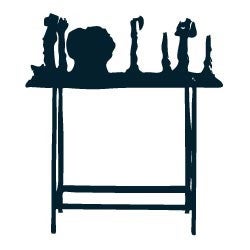Jim Dine is a painter and sculptor who grew up in Cincinnati, Ohio, where his family owned a hardware store. He often makes works of art that depict everyday objects, including tools. In this sculpture, he places everyday objects beside symbols of great works of art. In doing so, the artist may be telling us that he considers ordinary objects to be works of art too.
What ordinary objects do you see in this sculpture?
What other objects do you see? Do they depict something in history?
How might this array of objects tell a story?
Have your child choose a media of their preference (modeling clay, pen or pencil on paper, collage) and to try to replicate an object your child uses everyday (such as a toothbrush, a fork, or a pencil). Then, create objects from history (like a pyramid) and arrange them in a row. Tell a story about these objects and how they relate to one another. You can also make some of these objects much bigger or smaller than their real size. Ask how the change in size affects the way your child sees them. Point out the new things you notice about these objects.
Depict —To represent by a picture
Sculptor —An artist who makes works of art that have height, width, and depth
Sculpture —A work of art that has height, width, and depth

